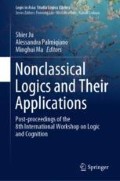Abstract
This paper formulates a topology of permission by extending Horty’s prioritized default theory, in order to study permissions with different defeasible manners in a reason-based reasoning. To do so, we reconstruct the prioritized default theory augmented with permissive norms and agents, so as to examine the possible relationships between permissions and defeasible norms in a agent-relative feature. This, we argue, brings about two essential elements the variety of permission and the multi-agent interaction in analyzing two noticeable pieces in Chinese and German legislations.
Access this chapter
Tax calculation will be finalised at checkout
Purchases are for personal use only
Notes
- 1.
Here we use \(\Rightarrow \) for the material conditional, and \(\rightarrow \) for default rules.
- 2.
Here obligation and permission have to be in the same account: either both in the conflict account or both in the disjunctive account.
References
Alchourrón, C.E., and E. Bulygin. 1981. The expressive conception of norms. In New Studies in Deontic Logic, 95–124. Springer.
Broome, J. 2013. Rationality Through Reasoning. Wiley.
Dong, H. 2017. Permission in Non-Monotonic Normative Reasoning. PhD thesis, University of Bayreuth.
Grossi, D. 2013. Abstract argument games via modal logic. Synthese 190 (1): 5–29.
Hansson, S.O. 2001. The Structure of Values and Norms. Cambridge University Press.
Hansson, S.O. 2013. The varieties of permissions. In Handbook of Deontic Logic and Normative Systems, vol. 1, ed. D. Gabbay, J. Horty, X. Parent, R. van der Meyden, and L. van der Torre. College Publication.
Hilpinen, R., and P. MaNamara. 2013. Deontic logic: A historical survey and introduction. In Handbook of Deontic Logic and Normative Systems, vol. 1, ed. D. Gabbay, J. Horty, X. Parent, R. van der Meyden, and L. van der Torre. College Publication.
Hohfeld, W.N. 1913. Some fundamental legal conceptions as applied in judicial reasoning. The Yale Law Journal 23 (1): 16–59.
Horty, J.F. 2000. Agency and Deontic Logic. Oxford University Press.
Horty, J.F. 2011. Rules and reasons in the theory of precedent.
Horty, J.F. 2012. Reasons as Defaults. Oxford University Press.
Horty, J.F. 2013. Common law reasoning.
Makinson, D. 2003. Bridges between classical and nonmonotonic logic. Logic Journal of IGPL 11 (1): 69–96.
Makinson, D., and L. van der Torre. 2003. Permission from an input/output perspective. Journal of Philosophical Logic 32 (4): 391–416.
Parent, X., and L. van der Torre. 2013. Input/output logic. In Handbook of Deontic Logic and Normative Systems, vol. 1, ed. D. Gabbay, J. Horty, X. Parent, R. van der Meyden, and L. van der Torre. College Publication.
Raz, J. 1994. Ethics in the Public Domain. Oxford: Clarendon Press.
Raz, J. 1999. Practical Reason and Norms. OUP Oxford.
von Wright, G.H. 1968. An Essay in Deontic Logic and the General Theory of Action. North-Holland Publishing Company.
Wenar, L. 2015. Rights. In The Stanford Encyclopedia of Philosophy, ed. E.N. Zalta. Metaphysics Research Lab, Stanford University, fall 2015 edition.
Acknowledgements
Huimin Dong is supported by the China Postdoctoral Science Foundation funded project [No. 2018M632494], the National Science Centre of Poland [No. UMO-2017/26/M/HS1/01092], the National Social Science Fund of China [No. 18ZDA290, No. 17ZDA026, No. 16AZX017], the MOE Project of Key Research Institute of Humanities and Social Sciences in Universities [No. 17JJD720008], and the Fundamental Research Funds for the Central Universities of China.
Author information
Authors and Affiliations
Corresponding author
Editor information
Editors and Affiliations
Rights and permissions
Copyright information
© 2020 Springer Nature Singapore Pte Ltd.
About this paper
Cite this paper
Dong, H. (2020). A Multi-agent Default Theory of Permission. In: Ju, S., Palmigiano, A., Ma, M. (eds) Nonclassical Logics and Their Applications. Logic in Asia: Studia Logica Library. Springer, Singapore. https://doi.org/10.1007/978-981-15-1342-8_5
Download citation
DOI: https://doi.org/10.1007/978-981-15-1342-8_5
Published:
Publisher Name: Springer, Singapore
Print ISBN: 978-981-15-1341-1
Online ISBN: 978-981-15-1342-8
eBook Packages: Religion and PhilosophyPhilosophy and Religion (R0)

